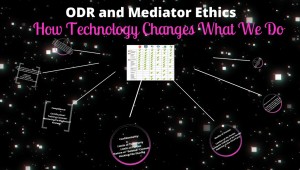ODR and Mediator Ethics
 The Fordham University ADR Conference scheduled for last week in New York City was, for obvious reasons, cancelled, but I had prepared a short talk on the impact of technology on the ethics of mediation to present at the conference. To begin thinking about the issue, I reviewed the ethics guidelines of the AAA, ABA, ACR, JAMS, the Commonwealth of Virginia (where I live), and the State of Texas (one of the states in which I teach). This link – ODR Ethics Prezi – is to the Prezi graphic presentation that I was going to use at the Fordham conference. Obviously, a lot of the presentation was going to be oral, but the landing points in the Prezi give some indication of where I was going with the issue of ethics and ODR.
The Fordham University ADR Conference scheduled for last week in New York City was, for obvious reasons, cancelled, but I had prepared a short talk on the impact of technology on the ethics of mediation to present at the conference. To begin thinking about the issue, I reviewed the ethics guidelines of the AAA, ABA, ACR, JAMS, the Commonwealth of Virginia (where I live), and the State of Texas (one of the states in which I teach). This link – ODR Ethics Prezi – is to the Prezi graphic presentation that I was going to use at the Fordham conference. Obviously, a lot of the presentation was going to be oral, but the landing points in the Prezi give some indication of where I was going with the issue of ethics and ODR.
I pulled 14 issues related to ethics that appeared in the ethics statements of the organizations mentioned above, and created a grid to show which ones were common and which ones popped up routinely across the board. I chose four of the fourteen issues on which to concentrate for the presentation. Arguably, all of the issues are affected by technology, but it seemed to me that, for purposes of a short presentation, the four I pulled out were the most affected, or at least the most obviously affected. The four are: Competence of the Third Party, Confidentiality of the Process, Quality of the Process, and Advancement of the Practice of Mediation.
Under Competence I was going to address certification, training and training content, mentoring and co-mediation, and review processes for third parties who use technology. Confidentiality brought up issues of what representations the third party can make regarding confidentiality online, the responsibility of the parties to maintain confidentiality, the nature of “deleted” content online (it’s almost never really deleted in a final sense), and hacking or file sharing. Quality of the process is related to the comfort level of the parties in a strange venue, the computer literacy of the parties and the expertise in using technology by the third party. Finally, Advancement of the Practice of Mediation, suggests issues related to integration of ODR into F2F modes, use of varied communication and data handling channels, and the use of evaluation and data analysis methods.
I’ve been invited by The ADR Commercial Law Journal to write an article about this topic – as scant as the information in the Prezi is, and as thumbnail-like as my comments here are, I’d appreciate any comments or observations that might be useful as I prepare the article – post them as comments on this blog, or send them to my e-mail address .

